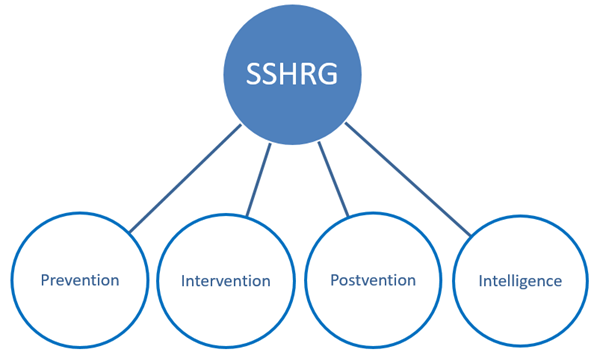Suicide and Self-Harm Research Group

Lead: Dr Pooja Saini, Reader in Suicide and Self-Harm Prevention
Co-leads: Dr Emma Ashworth, Senior Lecturer in Psychology
Dr Jennifer Chopra, Subject Leader in Psychology
What is the group about?
The Suicide and Self-Harm Research Group builds on existing areas of excellence in research and aligns with the national suicide prevention strategy (2019). Prevention strand incorporates: Investigating large data sets to understand the identification of risk and response pathways; exploring decision making. Intervention strand incorporates: responding to self-harm or suicidal behaviours; piloting, testing and implementing new innovative models of care in both community and hospital settings, focus on high-risk populations; evaluation and research of mental health NHS transformation change programmes. Postvention strand incorporates: evaluation and research of postvention services; piloting, testing and implementing new postvention models of care in both community and hospital settings; evaluating and research of community response plans. Intelligence strand incorporates: real-time surveillance data; sharing lessons learned and best practice across the region, nationally and internally.
Research Strands of SSHRG

Within LJMU there is a long and creditable history of research into suicide and self-harm, and in health and illness, based within three schools in the Faculty of Health – School of Psychology, Public Health Institute and School of Nursing and Allied Health – and the Institute of Health Research (IHR). Currently, while suicide and self-harm researchers in Psychology have related expertise and research interests, we need to build on our existing relationships and create a common forum where ideas can be exchanged and collaborations fostered. Recent advances in our knowledge of suicide and self-harm behaviours and health and social care issues have reinforced the fundamental multidisciplinary required for understanding the prevention, intervention, postvention and intelligence areas of suicidality. The Suicide and Self-Harm Research Group will bring together those researchers working in the field across public health and NHS services thus exploiting this multidisciplinarity. The proposed Centre will investigate the following types of questions that will inform service redesign and the needs of people at risk of suicide and/or self-harm:
- Why do people to self-harm?
- How do heritable traits moderate treatment outcomes?
- How are boys or men struggling in terms of different life outcomes, and how does this contribute to nihilism and suicidality?
- What helps people in suicidal crisis to reduce their suicidality?
- How does the way people think, feel and behave in relation to suicide and self-harm and other factors influence this?
- How do experiences of trauma, particularly suicide, contribute to suicidality?
- What are the benefits of rapid access to brief psychological therapy for people in suicidal crisis or who have recently self-harmed?
- What is the relationship between people’s psychological fusion with social groups, their social networks, the quality of their social interactions and loneliness?
- What are the benefits of mindfulness-based interventions delivered by Community Mental Health teams to those at risk of recurrent depression and suicidality?
- What is the relationship between adverse events on the farm and suicidal ideation in farmers?
- How effective are school-based prevention programmes and promotion interventions for children’s mental health, wellbeing and academic attainment?
- What are the psychological and physiological processes and mechanisms that underpin adolescent mental health difficulties?
- What are the most effective treatment options for people with complex mental health needs who have a higher prevalence of suicide attempts and self-harm?
The Centre will be based in the School of Psychology, part of LJMU's Faculty of Health, and will incorporate members of the Public Health Institute and School of Allied health and Nursing within an initial format.
Research Themes
- Service utilisation
- Autism
- Domestic violence
- Perimenopause and menopause
- School-based interventions
- Primary care interventions
- Intelligence data – regional and national
- Children and young people
- Complex mental health needs
- Safety planning
- Decision-making
- Public involvement in research
Academic and research staff
Loading staff profiles…
Faq Items
Collaborators
Strategic alignment
The Suicide and Self-Harm Research Group (SSHRG) actively participates in research that encompasses all 4 of the university’s strategies.
Faq Items
Outstanding student experience
Excellence in Education
Impactful research and scholarship
Civic and global engagement
Interdisciplinarity and collaboration
The group has membership from over 20 LJMU staff and researchers from across faculties and over 70 partner organisations based locally, nationally and internationally. All of the research involves stakeholder groups from the outset and to dissemination. Collaboration and coproduced research is at the centre of our groups work. Last year we hosted our first groups conference that was well received and is going to take place yearly. We also co-lead a regional Suicide and Self-Harm Research Conference in the North West (SSHaRE NoW) that is hosted at one of three universities yearly (University of Manchester and UCLAN). The lead of the group, Dr Pooja Saini is also the Co-Chair for the International Association for Suicide Prevention Special Interest Group ‘Suicide Prevention in Primary Care’ with international colleagues.
Outputs and outcomes
The group has had continuous impactful outcomes. The group publishes at least one peer-reviewed paper a month in world leading journals, members of the group have won multiple LJMU, regional, national and international awards for their research and have been invited to be Keynote Speakers at 3 conferences in the last year. Members have also been cited in government suicide prevention and mental health reports, regional reports, newspapers, BBC news, invited to speak on the radio, and to attend parliamentary meetings.


